Instructions for preparing parsley with salt for the winter and other ways to preserve it
What could be tastier than hot homemade soup or borscht in winter? Housewives know that dishes are especially aromatic if herbs are used in their preparation. But in the cold season, it is difficult to find truly natural and fresh herbs. In such situations, the preparation made in the summer comes to the rescue.
How to pickle parsley in a jar so as not to spoil it, in what conditions and for how long you can store herbs in this form - you will learn all this from our article.
The content of the article
Selection and preparation of parsley for harvesting
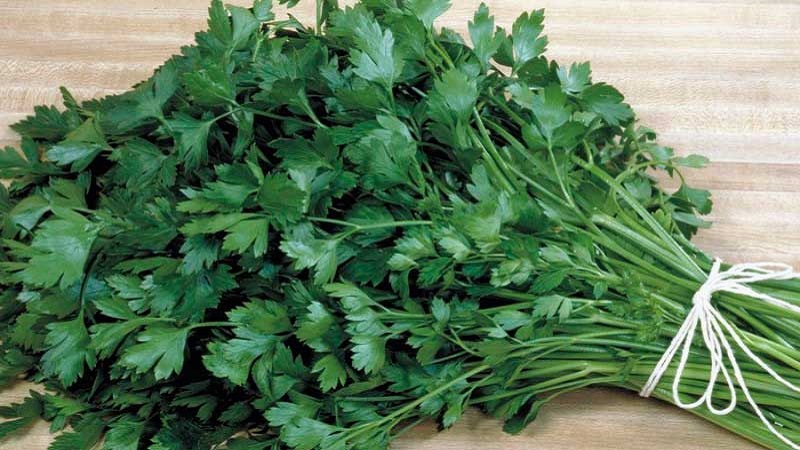
In summer, a lot of greenery grows in the garden, which makes the dishes tasty and aromatic. In winter, this product is more difficult - it is expensive and can be grown using harmful fertilizing. Bring a piece of summer to soups and main courses in the cold season will help blanks.
Harvest parsley it is often abundant - in such a situation, the question of how to quickly process the greens before it wilted is relevant. You can solve this problem with salting for the winter.
Harvesting parsley with salt for the winter is not burdensome and even inexperienced housewives can do it. Both the greens themselves and their roots are suitable for long-term storage.
Preference is given to herbs grown in their own garden. Collect greens during the day, in dry, sunny weather, when the dew melts. Fresh young twigs with delicate foliage are chosen for harvesting.
Council. For long-term storage, parsley is harvested in June before the flowering of the plant.
Housewives who do not have their own plot can harvest store or market greenery. The main thing is that the bunch is fresh and elastic without yellowed leaves.
How to prepare parsley with salt
Chopped herbs mixed with salt retain their flavor and aroma well. You can store green mixtures in the refrigerator. Both branches and parsley roots are suitable for salting.
Before salting, the greens are carefully sorted out and yellowed, sluggish and rough parts are removed. The green part of the herbs is harvested separately from the roots.
For salting, it is better to use 0.5 liter cans. The smaller the container, the better the greens will be salted in it.
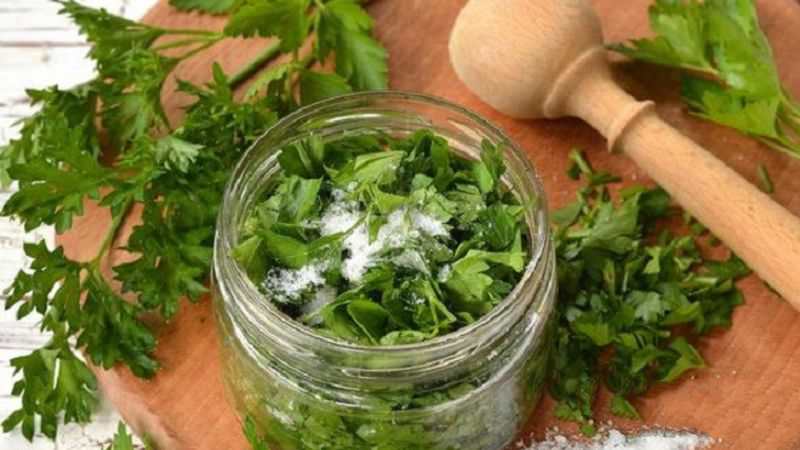
Ingredients, proportions
For preparation you will need:
- 500 g of chopped greens;
- 100 g of coarse salt.
The ratio of herbs to salt should be 5 to 1. Salt is better to use coarse, not iodized. If you use a fine mixture, the mixture will not be salted well and its shelf life will decrease.
Step-by-step instruction
Harvesting herbs is not difficult. For long-term storage, it is important that the material is clean. Since the mixture is not sterilized, store it in the refrigerator.
The algorithm for preparing the workpiece is as follows:
- Rinse the plants well with running water and dry.
- Finely chop the greens.
- Remove large stems.
- Grind the herbs with salt, the parsley should extract juice.
- Prepare a jar for preparation.
- Pour a thin layer of salt on the bottom of the container.
- Put the parsley in a jar and tamp well.
- Sprinkle a layer of salt on top of the greenery.
- Close the jar and store in a cool place.
Council. So that the greens are not bitter, they are soaked in cold water for 30 minutes before cutting.
For salting the parsley root, it is first peeled and then grated.
The blank can be used in a few days, but it is better to do it in winter, when there is a real need for fragrant and vitamin greens.Thus, you can preserve not only parsley, but alsocelery, cilantro and other herbs.
Other recipes for pickling in a jar
Parsley goes well with other herbs and vegetables. Housewives can prepare vitamin complexes that diversify lean soups, fish and meat dishes.
Important! When using this blank for soups and main courses, consider the amount of salt in it. Salt the main dish less.
With dill
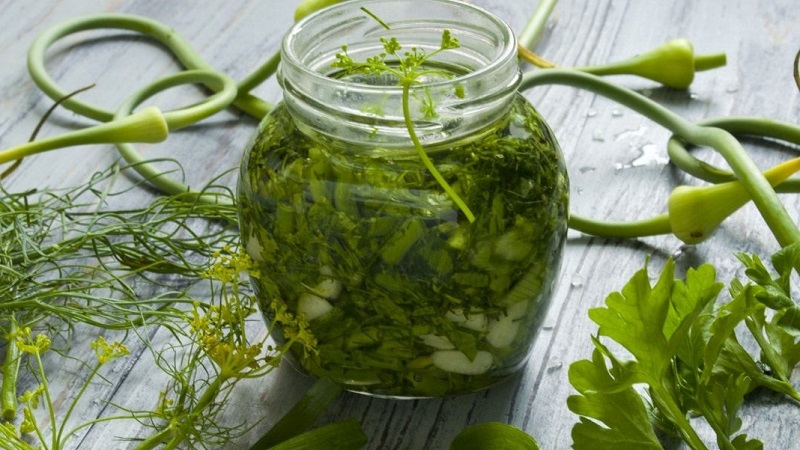
The peculiarity of harvesting these herbs is that they need to be salted separately, otherwise they will lose their individual taste and aroma.
For salting you will need:
- 0.5KG dill;
- 0.5 kg of parsley;
- 250 g of salt.
The greens are washed well and dried. Then they are alternately cut and put in two different bowls, where 125 g of salt are poured each. After the herbs have stood a little, they are mixed and laid out in banks, tamping well. You can pour a small layer of salt on top of the mixture.
With vegetables
Carrots, tomatoes, green onions, celery and dill can be salted with parsley. This blank is used for the preparation of soups, main courses and salads.
It will take:
- 1 kg of parsley;
- 1 kg of dill;
- 1 kg of leeks;
- 1 kg of carrots;
- 1 kg of tomato;
- 0.5 kg of celery;
- 1 kg of salt.
Recipe:
- Rinse greens and chop finely.
- Peel the carrots and cut into small pieces or grate.
- Wash the tomatoes, cut the stalks and cut into thin slices.
- Mix greens with salt and mix well, tamping.
- Place in a jar in layers: greens, carrots, herbs, tomato, etc.
- Once the container is full, close it with a lid or parchment paper secured with an elastic band or thread.
With celery
Celery is healthy, but does not last long. To extend the shelf life, it can be salted with parsley and dill.
Ingredients:
- 250 g parsley;
- 250 g dill;
- 250 g celery;
- 250 g of salt.
Rinse the parsley and dill, remove the coarse stems and cut into branches by 1.5-2 cm. Peel the celery, rinse and cut into pieces 2 cm long. Mix the ingredients and add salt. Spread the mixture in jars and leave to infuse for a couple of days. During this time, the workpiece will decrease in volume and let the juice out. After that, you can add the mass to the container and close the lid. Store the mixture in a cool place or refrigerator.
With garlic
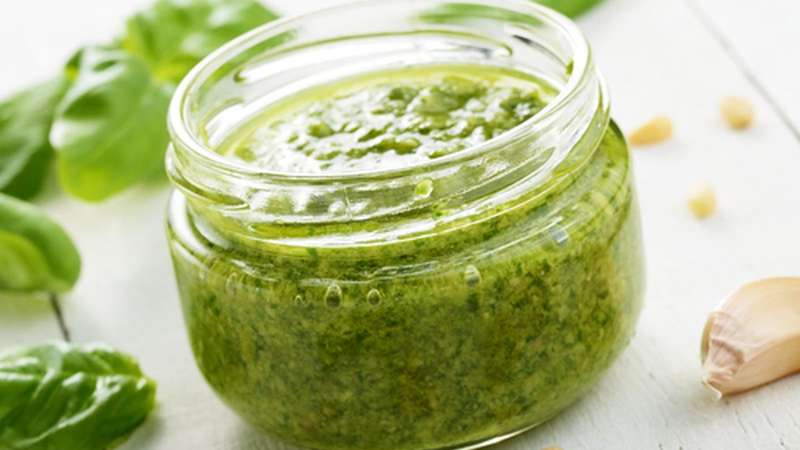
Garlic arrows are used to prepare a savory soup dressing.
You will need:
- 160 g parsley;
- 160 g dill;
- 160 g arrows of garlic;
- 70 g of salt.
Sort the greens, wash, dry and finely chop. Then put in a dish, salt and stir. Put in jars, tamping well. It is better to drain the released juice and use it immediately, as it tends to quickly acidify.
Other procurement methods
Besides pickling, there are several other ways to keep parsley fresh for months.
Drying
You can dry parsley branches and root. You can harvest in this way:
- in the oven;
- electric dryer;
- microwave;
- airfryer;
- in a natural way.
First, the greens are washed well with running water, then shaken off and laid out on towels. As soon as the moisture is absorbed into the material, the parsley is chopped randomly, removing the coarse stems.
If a dehydrator or an electric dryer is used for drying, put the greens in whole or in crushed form on a pallet and set the temperature to 40-50 ° C or the "For herbs" mode. Higher rates will lead to vitamin loss.
Drying time depends on the power of the device, air humidity, type of herbs and how they are cut. For uniform drying, the trays with the material are changed every 1.5 hours. On average, parsley is dried for no more than 5 hours. If the device has a good fan, the process will go faster.
Those who do not have an electric dryer can use an oven. Place the prepared parsley on a baking sheet lined with baking paper. The paper on which the herbs are placed should not be oiled.
The baking sheet is placed on the top shelf, the heating temperature should be 45-50 ° C. It is advisable to leave the oven door ajar. Drying takes 5-6 hours, the greens need to be checked from time to time.
Reference. To speed up the process, chop the parsley and spread it on a baking sheet in a thin layer. Drying will take 1.5-2 hours.
The microwave is also suitable for drying parsley. The herbs are laid out on a flat dish covered with a napkin or on a paper plate. The oven is turned on at full power for 2 minutes. After the readiness signal sounds, the greens are examined and, if necessary, the procedure is repeated. Housewives advise inspecting the parsley every minute of drying.
Chopped parsley can also be dried using the airfryer. The grass and roots are placed in the equipment, the door is not closed for air circulation. The temperature is set at 40-45 ° C, the power is maximum. It takes 20 minutes to dry the branches, and 40 minutes to dry the roots.
The easiest way to dry parsley without additional equipment is naturally in bunches or chopped. Greens, washed and dried from moisture, are tied in bunches and hung down with foliage in a ventilated room.
You can also spread the parsley whole or chopped on paper in a dry place. The thickness of the green layer should be no more than 1 cm. The drying room should not be exposed to direct sunlight to prevent the grass from turning yellow. For uniform drying, the material is stirred from time to time.
Natural drying can take 5-14 days, depending on the type of greens, how they are cut and the weather conditions.
Parsley root is thoroughly washed with a brush before drying. Then it is cut into thin slices or strips and placed in an electric dryer or oven. Drying naturally produces a cured product.
Freezing
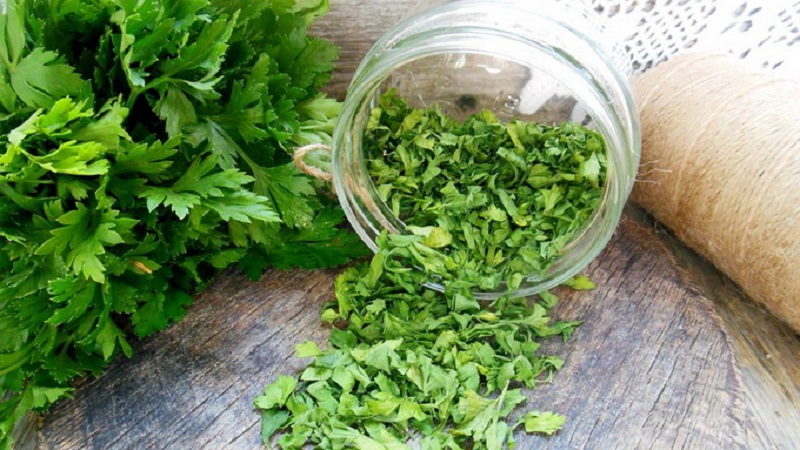
Only parsley is suitable for freezing... It is harvested in bunches or in a crushed state, depending on the purpose. Whole twigs parsley is used to decorate dishes, and chopped parsley is used to make sauces.
To freeze the herbs in a bunch, they are thoroughly washed and dried on a towel. Then they are laid out in portions into packages. Chopped parsley is frozen in the same way. The greens are cut into large or small pieces and placed in the freezer for storage.
Important! Thawed greens quickly lose their appearance, so they should not be frozen in one large bag.
Experienced housewives have adapted ice cube trays for freezing parsley. Such a blank is convenient to use - one cube is suitable for one serving of a dish. The finer the material is cut, the easier it is to put it in the mold. For easy storage and use, you can add a small amount of water to chopped parsley.
If there is a lot of greens, they are crushed in a blender, and then distributed in tins. It is important to remove all rough parts of the plant. This blank is used to make smoothies and sauces.
In oil
Parsley, frozen in tins, can also be poured with vegetable oil. Olive oil is preferred as it preserves the aroma of greens better.
Refined sunflower oil is also used to make canned parsley. After the greens are washed, dried, crushed and tightly packed in containers, oil is added to them. It is important to fill it up to the top of the can. To better fill the container, shake it up and turn it in different directions. This will completely cover the greens in the jar and expel any air bubbles.
Pickling
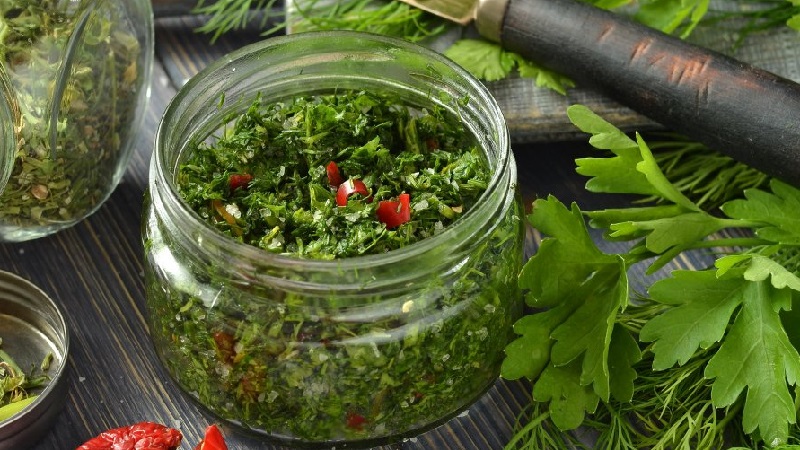
Only parsley roots are suitable for pickling.
For the marinade you will need:
- 4 tbsp. water;
- 1 tbsp. 9% vinegar;
- 0.5 tbsp. Sahara;
- 1-2 tsp salt;
- 4 garlic cloves, chopped
- 2 bay leaves;
- 5-7 peas of black pepper.
Instructions for pickling parsley:
- Rinse and dry the material beforehand.
- Cut into slices or cubes.
- Dip in salted boiling water for 2-3 minutes.
- Throw in a colander.
- Submerge in ice water for 30 seconds.
- Drain the water, put the root in jars.
- Pour boiling marinade over.
Terms and conditions of storage
Parsley mixed with salt will retain its taste for 6 months. The workpiece will not deteriorate if stored in a cool place - in a cellar, basement, insulated balcony or in the refrigerator. The temperature in the storage area should not exceed 7-8 ° C.
Dried herbs are stored in linen bags or paper envelopes in a dry place. Jars with lids can also be used.
Council. Check the workpieces from time to time in order to notice the appearance of dampness in time.
Conclusion
Parsley perfectly complements soups, as well as fish and meat dishes. It is also an essential ingredient in salads and stews. In winter, the body has a need for vitamins, which can be replenished with the help of fresh herbs. It is not difficult to prepare herbs, the main thing is to follow the instructions.
Parsley is well salted in any jars, but for blanks it is better to use small containers. For greater benefit, vitamin mixtures are prepared from parsley, dill, celery and vegetables. Such preparations will remind you of summer in a cold period and strengthen the body.